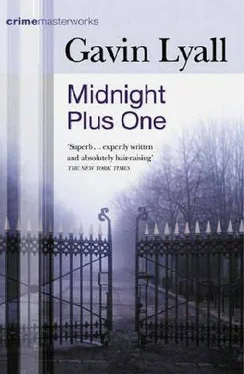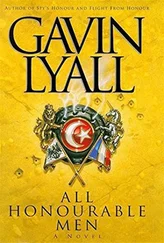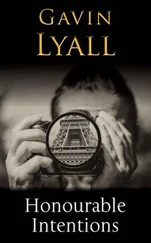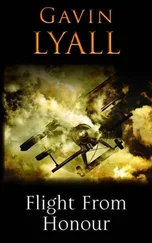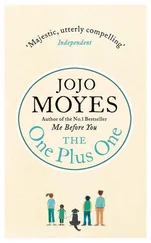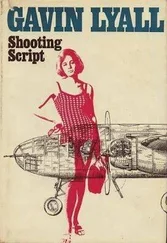I was getting too irritable. I'd been driving for nine hours and awake a lot longer, and the D roads weren't as soothing as the mainroutes nationales. By now I was tired and hungry – but most of all, I wanted a drink.
I glanced sideways at Harvey. Well, maybe I could slide off round the corner by myself and gobble a couple of quick ones when I went to phone Merlin.
The road turned into tarmac again and we wove down out of the pines.
Harvey said: 'Told you so. When do we lunch? '
'I'll stop in a village soon. Maybe Miss Jarman will go and buy something while I phone Merlin.'
'I will if you like. I'd prefer something hot, but I suppose you'll say it's too dangerous going into restaurants.'
'I just say it's a risk, Miss Jarman – and all I can do on this job is cut down on as many risks as I can.'
She waited a moment, then said: 'Before this trip's over, I may get rather tired of watching you avoid risks.'
I nodded. 'That's likely. But you may get tired of risks, too.'
Three-quarters of an hour later we reached a small village just before crossing the N140. It was just a square and a collection of houses and shops of old, solid stone huddled under the shoulder of the hill. I cruised quietly down into it, past the shop that was a combined newsagent and hairdresser, past the Gendarmerie Nationalewith its tricolour and a notice suggesting that if you wanted any law and order enforced at night you'd better call at the house twenty-five metres up on the right – and into the small, steep-sloped main square.
'There's no point in parking anywhere else,' I explained, before anybody asked. 'They'd notice a strange car more if it was parked in a side road. But we won't stay longer than we need.'
I walked across to the PTT building, set back behind its little railed courtyard from the days when the mail coach used to drive in to unload. I walked straight into the telephone box and asked for Merlin's office number.
Would his line be tapped? It wasn't likely they'd do that to a big Paris lawyer, but by now the police must be wondering how much Merlin knew about Maganhard. They must know the connection.
His secretary said he was occupied; I told her to get him unoccupied, quick. I gave my name as Caneton.
Merlin came on the line, first as a distant voice saying apologetically: '… m'excuse. Inspecteur.'A crafty lawyer doesn't get overheard by accident: he was letting me know the cops were with him at the time. Then he said:'Allo? Ah, monsieur: je suis désolé, mais l'arpenteur…'I didn't care how sorry he was what the surveyor had or hadn't done; I ought to slam down the phone and run.
But that would make the Inspecteurdoubly suspicious. Now, I had to say something. I might as well make it useful.
'I've turned off to join the Rat-line in the high country,' I said, speaking English fast in the hope that anybody overhearing couldn't follow English that fast; I hoped Merlin could. 'I think you should send a telegram in our friend's name, to the boat. It'll help mislead everybody.'
He gave me another apologetic spiel about the surveyor being a lazy hound but this was, after all, the season for house purchase.
'I'll probably ring this evening, when I know where we're staying the night. Are you being tapped? If you are, say you think the house price will go up.'
He assured me that the house price would stay as agreed – for, after all, they knew well Merlin's standing as a lawyer.
I grinned into the phone and said: 'Thanks, Henri – and while you're at it, buy me a nice lonely house in a village where nobody's heard of the police or international businessmen, will you?'
He assured me of his best attention at all times. We rang off and I came out sweating.
I walked slowly back across the square, wondering how stupid I'd been. If his phone was tapped, or if they decided for any reason to trace my call, then I'd sunk us. I couldn't outrun the ripples in this sort of hill country. But they'd need a whole department to track down every one of the calls Henri must get every day, so maybe the only danger was tapping. And he'd said not, and he should know.
I argued with myself right into a café. There I ordered a doublemarc, and bought a couple of packets of Gitanes while the man was pouring it. It took me a minute to polish off themarc and half a minute to ask – and get told – how long it would take to drive to Limoges, which was in exactly the opposite direction from our route.
Harvey looked at me curiously as I got back in. I dropped the cigarettes on the seat between us. 'One's yours, if you're running out.' I started up and drove carefully out of the square. 'What's for lunch?'
Miss Jarman said: 'Bread, cheese, paté, sardines, cherry tart. I got a bottle of red wine if you want it, and a bottle of Perrier.'
I said: 'I'll take Perrier: I'm driving.'
Harvey said: 'Same for me – I'm shooting.' He looked across at me. 'And I didn't even get a quick one in the café.'
I gave him a look that was supposed to be surprised. 'Me?'
He smiled, perhaps a little bleakly, but perhaps any smile looked bleak on his face. 'You. Hell, I don't mind. But I do know how quick you can get a quick one.'
We ate on the move, the girl handing over wedges of bread stuffed withpatéor cheese. She tried opening the sardines, spilled oil on herself, said: 'Damn them to hell,' and threw the full tin out of the window. Then, very coolly, she said: 'I'm sorry, we seem to be out of sardines.'
Maganhard gave a metallic chuckle.
I ate a bit of cherry tart and then lit a cigarette. I felt a lot more cheerful; even if they tried to seal off this area with roadblocks, they wouldn't necessarily catch me. I was almost back into the Auvergne again, and when I was on roads I knew… well, the Gestapo had once tried catching me with roadblocks there.
I knew the feeling was due a lot more to the doublemarc than to either the food or my knowledge of the back roads, and I had enough sense to know it wouldn't last more than a couple of hours. But while it lasted, I wanted to cover some ground.
The hillsides became lush, Gothic, overdone; the trees got romantically gnarled and twisted, set among rocks covered with thick moss like the green velvet sofas in old ladies' parlours. The whole thing looked like a set for an opera where they're trying to keep your mind off the singing.
I wasn't fond of this country; it was too thick and damp and it breathed down your neck. I wanted the clean cold uplands, where you can see a man coming at rifle-shot range.
Harvey asked: 'Who're we staying the night with?'
'Some friends.'
'From the Resistance?'
I nodded.
He asked: 'You're sure they're still there? And still friends?'
'Somebody will be. We've got a choice: I knew quite a lot of people down here. One of the Rat-lines went through there – taking escaped prisoners out, bringing supplies in.'
We passed through la Courtine, an army town that looked a bit like a barracks itself: open, empty, newly swept, and with a scruffy soldier leaning on every corner. Then dived into the valley of the Dordogne.
Maganhard said: 'Mr Cane.'
I waited for him to go on, then said: 'I'm still here.'
'Mr Cane – when we discussed – about policemen, you said you wouldskip the moral question. Why did you not argue it?'
Harvey and I glanced at each other. The old buzzard hadn't said a word in hours – had he been brooding onthis egg?
I said carefully: 'I wasn't sure you'd be interested, Mr Maganhard.'
'Why not?'
I shrugged and hoped he could see. 'Maybe I made a hasty judgement from circumstances – such as being chased across France by assorted police and crooks. But I judged you wouldn't be interested.'
'If we might skip the sarcastic question,' he said calmly, 'will you tell me why?'
Читать дальше
